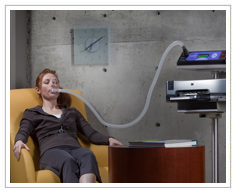UNDERSTANDING METABOLISM
Your body is an amazingly complex machine constantly adjusting its metabolism… the process of converting food into energy. During this biochemical process, calories in food and beverages are combined with oxygen to release the energy your body needs to function. Understanding this cycle is important and will put you on the path to healthy living.
Did You Know That Your Body Never Truly Rests?
Even when you are sleeping or sitting quietly, your heart is beating and your body is carrying out other “hidden” functions that you are entirely unaware of (growing and repairing new blood cells, detoxifying, adjusting hormone levels, circulating blood, etc.). This all requires energy.


Resting metabolic rate (RMR) is the measurement of how much food, or energy, is required to maintain basic body functions such as heartbeat, breathing, and maintenance of body heat while you are in a state of rest. That energy is expressed in “calories per day”. So an RMR measurement shows how many calories you burn at rest, doing nothing more than sitting in a chair.
Understanding the three factors that determine how your body burns calories is extremely important to the success of your nutrition program. The three factors are:
- Resting metabolic rate – the process of converting food into energy accounts for about 60 to 75 percent of the calories burned each day.
- Physical activity and exercise – such as playing tennis, walking to the store, chasing after the dog and any other movement, account for about 20 percent of the calories your body burns up each day. Physical activity is by far the most variable of the factors that determine how many calories you burn each day.
- Food processing (thermogenesis) – digesting, absorbing, transporting and storing the food you consume also takes calories. This accounts for about 10 percent of the calories used each day. For the most part, your body’s energy requirement to process food stays relatively steady and isn’t easily changed.
Your metabolism is the most powerful tool you have for achieving your ideal weight. Several factors determine your individual metabolism including:
- Your body size and composition – the bodies of people who are larger or have more muscle burn more calories, even at rest.
- Your sex – men usually have less body fat and more muscle than do women of the same age and weight, burning more calories.
- Your age – as you get older, the amount of muscle tends to decrease and fat accounts for more of your weight, slowing down calorie burning.
Because we all have different resting metabolic rates, the amount of food required for one person to lose weight may actually cause weight gain for someone else with the same age, sex, weight, height, and even the same body fat percents. This is why its so critical to know and to constantly monitor your resting metabolic rate.
How Metabolic Testing Works
During the test, the air you breathe out is collected and analyzed to determine a precise measurement of the volume and concentration of oxygen your body consumed in a resting state. It relies on the fact that burning 1 calorie requires 208.06 milliliters of oxygen. This testing procedure is the only accurate and clinically feasible method of measuring energy expenditure, also referred to as the “caloric burn rate”.
How a RMR Test Will Help You
In the past, a metabolic test was only available at universities and hospitals. However, Korr Medical Technologies introduced the ReeVue, a state-of-the-art medical device for determining metabolic measurements designed specifically for healthy weight loss and accurate nutritional assessments.
By testing your resting metabolic rate with this device, we can scientifically pinpoint your “caloric weight loss zones” and structure a nutrition program that works specifically for your body while taking the guess work out of determining your calorie intake needs.
RMR Test Preparations
- It is important that you are able to reach a resting state 15 minutes before your test.
- Avoid exercising at least 4 hours prior to the test (12-24 hours preferred).
- Avoid eating or taking stimulants (caffeine, nicotine, energy drinks, etc.) at least 4 hours prior to the test (8-12 hours preferred).
- You will then sit back, breath normally and in about 10 minutes the ReeVue will calculate your resting metabolic rate.
If you have specific questions about the Resting Metabolic Rate (RMR) test or would like to schedule an appointment, please contact the Nutrition Clinic of Northern California today.




